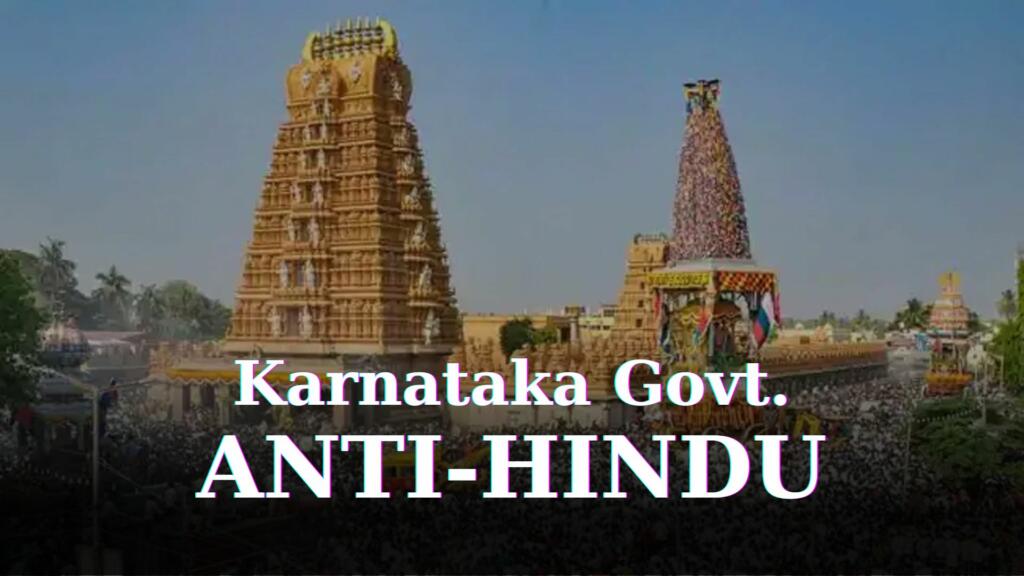The recent extract of the ‘Karnataka Hindu Religious Institutions and Charitable Endowments Bill 2024’ in the state assembly has sparked controversy and drawn sharp criticism from the opposition Bharatiya Janata Party (BJP). BJP stated, this as a money-making business and reliably ‘Anti-Hindu’. The bill, which allows the government to levy a 10 percent tax on temples with revenues exceeding ₹1 crore and a 5 percent tax on those with revenues between ₹10 lakh and ₹1 crore, has ignited a debate over the intersection of politics and religion in Karnataka.
The BJP’s Allegations
The Bharatiya Janata Party (BJP) in Karnataka, led by Vijayendra Yediyurappa, has vehemently criticized the Congress government’s passage of the ‘Karnataka Hindu Religious Institutions and Charitable Endowments Bill 2024’, labeling it as “anti-Hindu”. Yediyurappa accuses the government of deliberately targeting Hindu temples to shore up its finances, suggesting that the imposition of a tax on temple revenues is a means to fill its coffers at the expense of devotees. The BJP raises concerns over the potential misuse of these funds, asserting that it could undermine the sanctity of temple offerings and lead to mismanagement in the allocation of resources meant for temple development.
Government’s Defense
In response to the BJP’s allegations, Karnataka minister Ramalinga Reddy denies their claims, accusing the BJP of politicizing religion for its own gains. Reddy defends the Congress government’s track record, asserting that it has historically safeguarded Hindu interests and temples, thereby challenging the BJP’s assertion of being the true champions of Hinduism. Moreover, Reddy questions the BJP’s accountability during its own tenure, highlighting instances where temple revenues may have been neglected despite existing legislation.
Also Read: CAA: A Journey From the Nehru-Liaquat Pact
Clash of Ideologies
The controversy surrounding the ‘Karnataka Hindu Religious Institutions and Charitable Endowments Bill 2024’ exposes a clash of ideologies between political and religious spheres in Karnataka. The Bharatiya Janata Party (BJP) has accused the Congress government of religious bias, suggesting that the imposition of taxes on Hindu temples is a deliberate attempt to undermine Hindu interests for electoral gains. This highlights concerns about the politicization of Hinduism, where religious sentiments are exploited for political agendas.
In contrast, the Congress government’s defense underscores the challenges of balancing religious sentiments with governance responsibilities. They argue that the bill aims to address revenue shortages amid economic challenges, indicating a pragmatic approach to governance. However, the controversy raises questions about the transparency, accountability, and equitable distribution of temple funds. Critics fear that the collection of taxes from temples could lead to the misuse of funds or favoritism in resource allocation, undermining the sanctity of temple offerings and hindering temple development.
Implications for Governance
The implications for governance are significant. On one hand, the passage of the bill reflects the government’s efforts to address fiscal deficits and ensure financial stability. Yet, on the other hand, concerns about transparency and accountability highlight the need for effective oversight mechanisms. The government must address these concerns to uphold principles of good governance and preserve religious freedoms. This requires fostering dialogue with opposition parties, religious leaders, and stakeholders to find consensus-based solutions.
Moving forward, it is imperative for the government to prioritize transparency and accountability in temple management. This could involve establishing independent oversight bodies or involving temple committees in financial decision-making processes. Moreover, the government must communicate its intentions clearly to alleviate fears of religious bias and ensure public trust in its actions. By addressing these concerns, the government can demonstrate its commitment to effective governance while upholding the principles of religious freedom and secularism.
In Conclusion, The controversy surrounding the Karnataka Hindu Religious Institutions and Charitable Endowments Bill 2024 highlights the delicate balance between politics and religion in governance. While the BJP accuses the Congress government of targeting Hindu temples for financial gain, the government defends its actions as necessary for revenue generation. As the debate continues, it is imperative for policymakers to prioritize transparency, accountability, and the preservation of religious freedoms in temple management.
Also Read: How Indian Forces are evolving from “Ghulami Ki Maansikta”?
